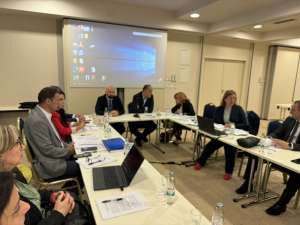SARAJEVO, June 9 (FENA) - "Risk assessment and prevention of human trafficking in supply chains" is the topic of today's conference in Sarajevo, where domestic and international experts are trying to find the best solutions to prevent human trafficking for the labor exploitation in supply chains, with particular reference to the role of government and the private sector, as well as current legislation in the European Union and worldwide.
The conference was organized by the OSCE Coordinator's Office for Combating Trafficking in Human Beings, in cooperation with the OSCE Mission to BiH and the Anti-Trafficking Section of the BiH Ministry of Security.
In a statement to the media, the Head of the OSCE Mission to BiH, Ambassador Kathleen Kavalec, University of Nottingham Professor Alexander Trautrims, Samir Rizvo from the BiH Ministry of Security and Julia Schellhaus of the OSCE Office in Vienna said the fight against human trafficking was a key priority of the OSCE Mission to BiH.
"Networks of fraud, coercion and abuse trap hundreds of thousands of socially and economically vulnerable categories of people around the world. Victims of human trafficking for the purpose of labor exploitation, live and work in conditions that are often on the verge of human dignity," said Kavalec.
Therefore, she added, the conference will help enumerate and promote the responsibilities of states, to ensure that the private sector conducts the necessary in-depth analyses, and to prevent and respond to the risks of human trafficking for labor exploitation.
"This will help to clarify the role of the private sector in terms of respect for human rights in general, as well as to clarify what relevant actors can do to stop and prevent human trafficking," concluded Kavalec.
Professor Trautrims believes that today more work is being done on the prevention of human trafficking, and trafficking for the purpose of forced labor and that laws are being passed at the level of the EU, the USA, as well as in the G7 countries.
"About 26 million people in the world are exposed to trafficking for the purpose of labor exploitation. It’s just one spectrum of people being forced to work. The results of their hard work, in the field of agriculture, food processing, in the end, we consume as customers or companies," said Trautrims.
Therefore, the best way to work on this problem, he concluded, is prevention, although it is very difficult, but "today we are here to support the work on the prevention of human trafficking in BiH."
Based on data from the BiH Ministry of Security, 56 potential victims of human trafficking have been identified in BiH, but, as Samir Rizvo said, that number does not show the actual situation on the ground.
"It is impossible to measure how much prevention has had an effect on combating human trafficking. It would be good to narrow that space as much as possible, at least in the part of the public procurement supply chain," Rizvo emphasized.
According to Julia Schellhaus, the conference discusses several laws in force, the OSCE guidelines, and what steps BiH can take to act preventively to reduce the trafficking of humans for labor exploitation and the phenomenon as a whole.
(FENA) S. R.











